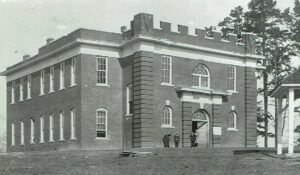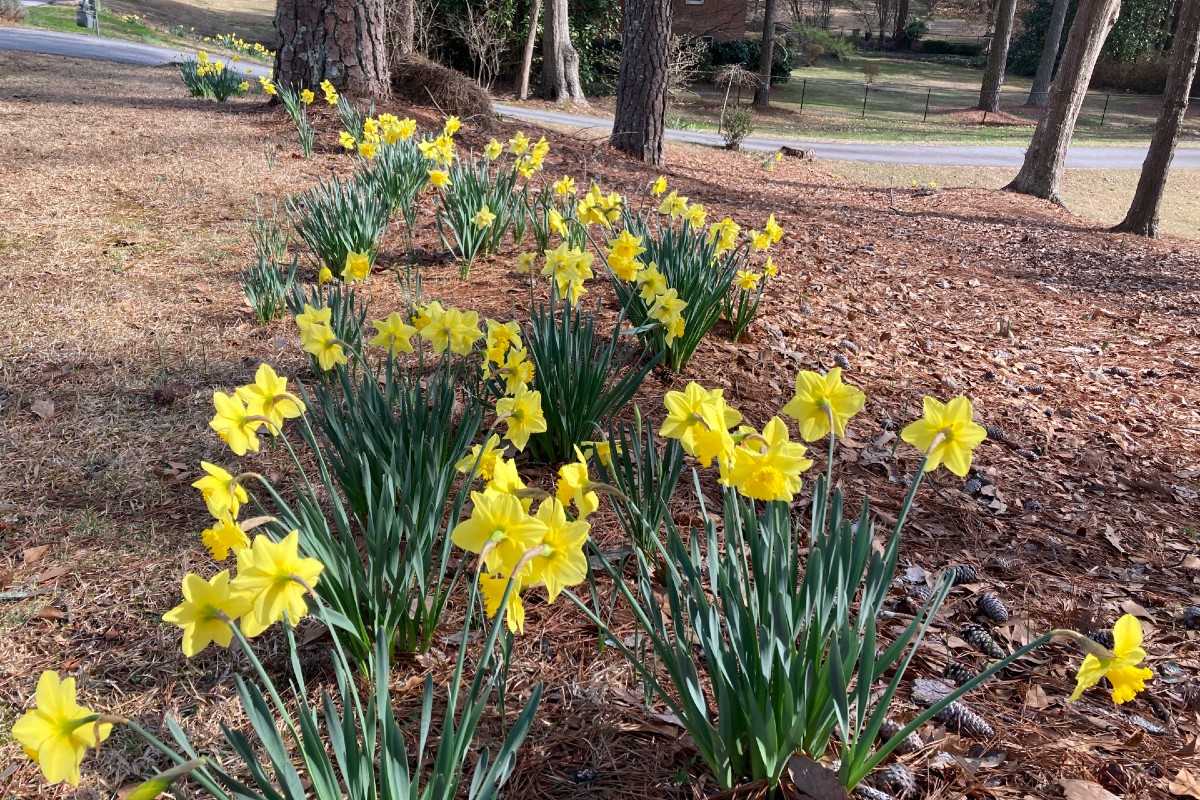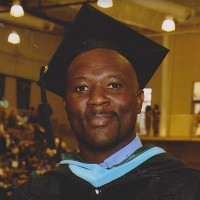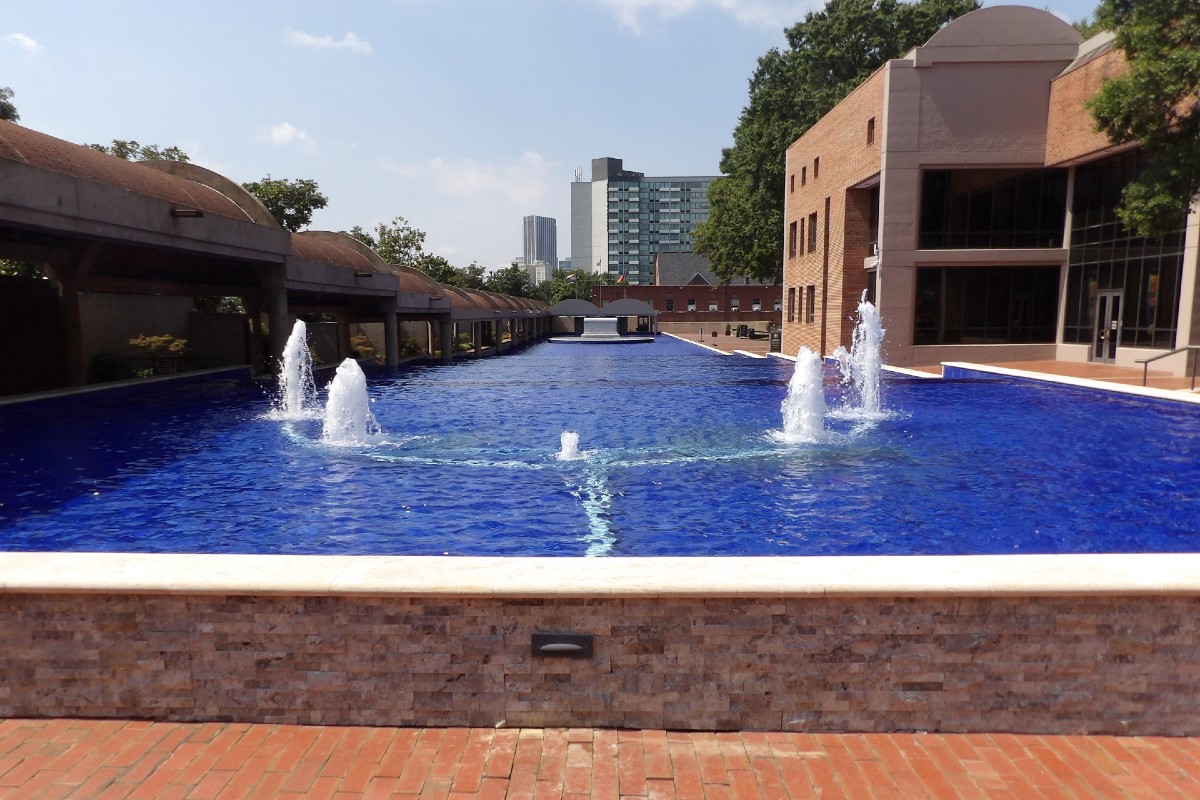GwinnettForum | Number 22.14, Feb. 17, 2023
HAPPY DAFFODILS: Thursday’s temperature at 3 p.m. was 70 degrees, and it was another beautiful day, as these yellow daffodils enjoyed the afternoon sun. Watch out, for cooler weather is coming, and by Saturday, the prediction is for below freezing again, and the temps not hitting 70 again until Tuesday. Yes, February can vary, with the weather usually being most delightful this time of year in Gwinnett.
TODAY’S FOCUS: Commerce and tolerance led to Atlanta’s amazing growth
EEB PERSPECTIVE: Like an unwelcome guest, sports betting back before us
SPOTLIGHT: The Gwinnett Stripers
FEEDBACK: Send us your thoughts
UPCOMING: GGC professor says we don’t have to worry about fungus
NOTABLE: Recent county actions should improve mobility and safety
RECOMMENDED: Demon Copperhead by Barbara Kingsolver
GEORGIA TIDBIT: Blind minister was also performer and composer of popular songs
MYSTERY PHOTO: Have you seen this water feature?
CALENDAR: League of Women Voters hold Feb. 20 meeting in Peachtree Corners
Commerce, tolerance led to Atlanta’s amazing growth
(Editor’s note: the following is a condensed version of a talk given to the Gwinnett Rotary Club by a teacher at Berkmar High School. He recently was recognized as the Outstanding Teacher in American History Award by the Philadelphia Winn chapter of the Daughters of the American Revolution in Lawrenceville. He is a graduate of Georgia State with a bachelor’s and master’s degree and lives in Snellville with his wife, Kristi, also a Berkmar teacher, and their son, Lloyd Jr.)-eeb
By Lloyd Williams
SNELLVILLE, Ga. | Do you cherish economic growth? Want to see your real-estate values increase? Do you wish for a better world for your children and grandchildren?
If your answer to any of those questions is yes, then we must have peace, tolerance, and understanding on both the local and global level. I’ve taught high school social studies for nearly two decades. As I try to explain to my students, the past shapes the present. If we understand how we got here, we can be the architects of a better tomorrow.
To see the benefits accrued in the pursuit of tolerance, one need only consider the history of Atlanta. This city was established as a logistical hub for the rapidly expanding railroad network in the mid-19th century. Strong business ties to the rest of the Union facilitated the city’s rapid development after the destruction of war. A string of tolerant leaders made key decisions which placed economic growth over petty hatreds.
In 1919, a racetrack south of the city was converted into a small airfield. This move was spearheaded by Atlanta Mayor William B. Hartsfield. A racial moderate, Hartsfield coined the phrase “the city too busy to hate.” During World War II, he was amenable to Federal funding for expansion of the airfield. Of course, that money had strings attached, strings that required fair and equitable employment opportunities for minorities. Other municipalities rejected those conditions.
But not Hartsfield. During the war, Atlanta became a national aviation hub. And the rest is history.
However, Atlanta hasn’t always lived up to Hartfield’s motto. In 1964 Mayor Allen wanted to host a celebratory dinner to honor Dr. Martin Luther King’s Nobel Peace Prize. It was to be an integrated event. Many of Atlanta’s old guard didn’t want to attend.
This was a problem. By the early 60s Atlanta was pulling ahead of Birmingham for the title of “Queen city of the Southeast.” Many, including the leadership of Coca Cola had high hopes for Atlanta. The leadership of Coca Cola acted. At a gathering Coca Cola’s CEO Chairman Paul Austin presented an ultimatum to the city: “It is embarrassing for Coca-Cola to be located in a city that refuses to honor its Nobel Peace Prize winner. We are an international business. The Coca-Cola Company does not need Atlanta. You all must decide whether Atlanta needs the Coca-Cola Company.”
As a result, the City of Atlanta honored Dr. King with a sit-down, integrated banquet, the first for the city. Again, “the rest is history.”
Speaking of Birmingham: for the first half of the 20th century, the Magic City had the edge over Atlanta. But by the 1960s, figures like Police Chief Eugene “Bull” Connor came to define Birmingham. When given the choice between progress and prosperity, or bigotry and stagnation, Birmingham doubled down on hatred. Meanwhile, Atlanta was spared the drama of the civil rights movement, with many Civil Rights leaders calling Atlanta home, and the most dramatic scenes of the Civil Rights movement took place on the streets of Birmingham. This had consequences. When Delta was looking for a new headquarters, Birmingham was among the candidates passed over in favor of Atlanta.
And again, “the rest is history.”
Like an unwelcome guest, sports betting back before us
By Elliott Brack
Editor and Publisher, GwinnettForum
FEB. 17, 2023 | Some things you can count on.
- You must sweep the kitchen floor quite often. Somehow, somehow, trash arrives.
- When waiting for rain to wash your car, the rain comes after it goes through the car wash.
- Kids no longer lose their homework. The computer, not the dog, now eats it.
- And each year, sports betting will be proposed in the Georgia Legislature.
![]() Yes, it’s back again, this time with a new twist. The sports betting lobby has paid big bucks to high-jinks lawyers who maintain that, of all things, the State of Georgia can pass gambling legislation without going through a Constitutional Amendment vote by the people.
Yes, it’s back again, this time with a new twist. The sports betting lobby has paid big bucks to high-jinks lawyers who maintain that, of all things, the State of Georgia can pass gambling legislation without going through a Constitutional Amendment vote by the people.
Can you believe that? Obviously, it is unconstitutional. After all, the people are the final authority on such matters, according to all challenges on this question in the past.
But no, the sports betting and its bevy of lawyers say, betting can become legal in Georgia simply because back in 1992 Georgians passed the lottery? But it did so through a Constitutional Amendment.
What? Yes, we passed the lottery, but nowhere in that legislation does it say anything about sports betting. Go look it up!
The sports betting people have brought together legislators from both sides of the aisle in an attempt to get the bill passed. The bill was introduced by Republican Billy Hickman of Statesboro, and co-authored by Gwinnett’s own Clint Dixon of Buford, plus Brandon Beach of Alpharetta, all Republicans. The two Democratic co-sponsors are Ed Harbison of Columbus and Powell Sims of Dawson, Ga.
One reason legislators have pushed for sports betting for years is that it would bring a massive new source of revenue to our state, no doubt something these same legislators would like to help spend in their communities
Then there’s this new twist. You would not have to go to a “sports parlor” or a sporting event to place a bet. Nodding to the new day, you could place bets through your cell phone, even through an old- fashioned land line, or through a kiosk at that sports venue. You could bet on professional teams, college games, or even on the Olympic Games! What! Ruin that venue, too?
You can almost hear the Department of Revenue saying: “Money, money, money.”
In the past, sports betting has been unable to get through the Legislature, because of the strict requirements to change the Georgia Constitution. The Constitutional Amendment is key, since it takes a two-thirds vote in both the House and Senate to pass, before it can go to the people to vote on statewide, where only a majority is required to become law.
A Constitutional Amendment becomes harder in the Legislature, since the Republicans do not have a two-third majority in either house. Not only that, but some “real” conservative Republicans, and Democrats, oppose sports gambling. Now you see why the sports betting people are lining up behind making this a simple legislative bill to get the sports betting underway in Georgia.
You can bet your booty that sports betting will get a thorough airing by those opposed to it, drawing heavy Constitutional challenges.
By the way, here’s an interesting nuance: the sports betting proposal is being called the “Georgia Sports Betting Integrity Act!” You read that right. These proponents are trying to tie in sports betting with integrity? We somehow miss their point, and expect that most Georgians will, too.
The Legislature should not allow sports betting to be approved by this sneaky, back door approach. If it comes out of the Legislature, it should allow the people of Georgia to vote on it. May it never pass.
- Have a comment? Send to: elliott@brack.net
The Gwinnett Stripers
 The public spiritedness of our sponsors allows us to bring GwinnettForum.com to you at no cost to readers. The Gwinnett Stripers, Triple-A International League affiliate of the 2021 World Series Champion Atlanta Braves, play at Coolray Field in Lawrenceville. For single-game tickets, memberships, team merchandise, or more information, visit GoStripers.com. Follow the Stripers on Facebook, Twitter, Instagram and TikTok at GoStripers.
The public spiritedness of our sponsors allows us to bring GwinnettForum.com to you at no cost to readers. The Gwinnett Stripers, Triple-A International League affiliate of the 2021 World Series Champion Atlanta Braves, play at Coolray Field in Lawrenceville. For single-game tickets, memberships, team merchandise, or more information, visit GoStripers.com. Follow the Stripers on Facebook, Twitter, Instagram and TikTok at GoStripers.
Send us your thoughts
We encourage you to send us your letters and thoughts on issues raised in GwinnettForum. Please limit comments to 300 words, and include your hometown. The views of letters are the opinion of the contributor. We reserve the right to edit for clarity and length. Send feedback and letters to: elliott@brack.net.
GGC professor says we don’t have to worry about fungus
Could a fungus be the last of us? That question is the premise of HBO’s critically acclaimed series The Last of Us. That’s what a Georgia Gwinnett professor is studying.
Based on the video game, the series follows an ominous, but hopeful tale of a small group of survivors along the lines of other recent post-apocalyptic dramas like The Walking Dead.”
What sets The Last of Us apart is the seemingly terrifying plausibility of its plot. Set in 2023, events in the show take place 20 years into a global pandemic caused by a mass fungal infection, which causes people to transform into zombie-like creatures and collapses society.
The fictional fungus in the show is based on the Cordyceps, a genus of fungi that is parasitic on insects and other arthropods. In some insects, the fungus can grow a network of roots through the body and into the muscles, flooding the brain with chemicals that compel the host to go where conditions are perfect for the fungus to grow and release its spores.
To a layperson it seems quite plausible, but according to an actual subject matter expert at Georgia Gwinnett College, we don’t need to start stocking up on food and fortifying our homes quite yet.
Dr. Lee Kurtz, professor and chair of biological sciences at GGC says: “Definitely not! Cordyceps could not grow in the human body, our internal temperature is too high for them to survive. The fungus can infect insects, most notably ants and caterpillars, spiders and more commonly other fungi.”
Kurtz confirmed that what Cordyceps can do to its host is astounding, but somewhat unusual.
“When they infect insects, they take control and force the insect to climb to a high spot so it can release its spores,” she explained. “But these spores are not terribly common, especially when compared to other fungi like Aspergillus and Penicillium that are found in air.”
People might be interested to know that, even though they don’t have to worry about parasitic fungi turning them into zombies, other fungi can be found all over – and in – the human body.
Some of them are welcome guests, others not, said Kurtz.
“Fungi are everywhere,” she said. “Fungi, mainly yeasts, can be found on our skin and in our gut. They play an important role in helping us maintain homeostasis. However, there are fungi that can cause infections if they can get access. They are generally opportunistic pathogens, not true pathogens. They don’t normally cause disease in humans, but if someone is immunocompromised or has an open wound, etcetera, they can take advantage of that access to cause disease.”
While The Last of Us might be doing to fungi what Jaws did to sharks in the collective consciousness, Kurtz wants people to know that they play an essential role in maintaining life on our planet.
“Fungi can live in dark, damp places — which most people know — but they also grow on drywall, ceiling tiles, even paint on air vents. We wouldn’t have plants without fungi in the soil. The fact is that they are critical to our ecosystem and can be found anywhere we look.”
Recent county actions should improve mobility, safety
The Gwinnett County Board of Commissioners have taken several actions to increase mobility and safety. Here are some highlights:
 The Board approved Gwinnett Transportation to apply for two grants worth $25 million each. It’s part of the U.S. Department of Transportation’s Rebuilding American Infrastructure with Sustainability and Equity grant program. The first grant will be used to upgrade the Gwinnett Place Transit Center’s condition and how it functions. The funding will build an energy efficient facility with onsite customer service and ticketing connections and would support zero emission transit vehicles. The second grant would go towards building a multi-use trail from Gwinnett Place to McDaniel Farm Park.
The Board approved Gwinnett Transportation to apply for two grants worth $25 million each. It’s part of the U.S. Department of Transportation’s Rebuilding American Infrastructure with Sustainability and Equity grant program. The first grant will be used to upgrade the Gwinnett Place Transit Center’s condition and how it functions. The funding will build an energy efficient facility with onsite customer service and ticketing connections and would support zero emission transit vehicles. The second grant would go towards building a multi-use trail from Gwinnett Place to McDaniel Farm Park.
Additional sidewalks are coming to Plazas Las Americas area.The county is enhancing safety for pedestrians around Plazas las Americas. New sidewalks will be installed on Pleasant Hill under the Ronald Reagan Parkway overpass. In addition to new sidewalks, a pedestrian warning system will alert drivers. Smart Road Technology was awarded the construction contract. The upgrades are funded by SPLOST at a cost of $868,000.
In addition, the Gwinnett Police are getting six outdoor security cameras. The Evermore Community Improvement District donated six new security cameras, which cost $2,395 each, to Gwinnett Police. These new cameras will work together with Gwinnett Transportation’s cameras; in addition to providing more safety to business parking lots and storefronts in the Evermore district.
Tag agent announces new kiosk in Lilburn at Kroger
Gwinnett County Tax Commissioner Denise R. Mitchell announces the installation of the ninth tag-renewal kiosk in Gwinnett County. The new self-service kiosk was recently installed in the Kroger store at 3050 Five Forks Trickum Road in Lilburn. The Kroger is in Five Forks Crossing.
The new kiosk is accessible during the store’s operating hours, 6 a.m. to 11 p.m., Sunday through Saturday. To renew at a kiosk, drivers must have an up-to-date Georgia driver’s license and a correct address on their renewal notice. They must have liability insurance and proof of a passed emissions inspection must be on file with the state.
- Have a comment? Send to: elliott@brack.net
Demon Copperhead by Barbara Kingsolver
![]() From Tim Anderson, Fitzgerald: Barbara Kingsolver is a national treasure. Her latest offering is a masterful revelation of the opioid crisis in rural Appalachia layered with the dark side of poverty and the foster care system in America. That she can minutely examine all of that in 550 pages is yet another sign of her genius. Demon Copperhead is a nickname for Damon Fields, a young teen with fiery red hair, who loses his young mother to a drug death, and is tossed into foster care at age 11. We can’t explore all of the horrors he faced beyond hunger, child labor and simple neglect, but we’d not wish his life on anyone. A high school football injury thrusts him into addiction to opioids. Sadly, Demon has very few people in his inner circle who were not also addicts. This book is not a happy one; Kingsolver makes it one we need to read.
From Tim Anderson, Fitzgerald: Barbara Kingsolver is a national treasure. Her latest offering is a masterful revelation of the opioid crisis in rural Appalachia layered with the dark side of poverty and the foster care system in America. That she can minutely examine all of that in 550 pages is yet another sign of her genius. Demon Copperhead is a nickname for Damon Fields, a young teen with fiery red hair, who loses his young mother to a drug death, and is tossed into foster care at age 11. We can’t explore all of the horrors he faced beyond hunger, child labor and simple neglect, but we’d not wish his life on anyone. A high school football injury thrusts him into addiction to opioids. Sadly, Demon has very few people in his inner circle who were not also addicts. This book is not a happy one; Kingsolver makes it one we need to read.
- An invitation: what books, restaurants, movies or web sites have you enjoyed recently? Send us your recent selection, along with a short paragraph (150 words) as to why you liked this, plus what you plan to visit or read next. Send to: elliott@brack.net
Blind minister was also performer and composer
The Rev. Andrew Jenkins of Atlanta was a leading composer of songs popular among southern gospel singers. He has been credited with more than 800 compositions, of which more than two-thirds are sacred songs. Jenkins’s best-known gospel song is “God Put a Rainbow in the Cloud” (1931), which has been recorded by numerous singers, including Mahalia Jackson.
 Jenkins was born on November 26, 1885, in Jenkinsburg, about 30 miles south of Atlanta. In his infancy a medical error left him with only partial vision. Too blind to function in public schools but not sufficiently impaired to qualify for the state’s school for the blind, Jenkins had to rely on his own resources to obtain an education. Later in life, another accident rendered him totally blind.
Jenkins was born on November 26, 1885, in Jenkinsburg, about 30 miles south of Atlanta. In his infancy a medical error left him with only partial vision. Too blind to function in public schools but not sufficiently impaired to qualify for the state’s school for the blind, Jenkins had to rely on his own resources to obtain an education. Later in life, another accident rendered him totally blind.
Jenkins discovered at an early age that he could play by ear almost any musical instrument he could get his hands on. “I never took a lesson,” he once said. “It’s a God gift.”
Licensed to preach at the age of 20, Jenkins moved to Atlanta, where he supplemented his income as a preacher by selling newspapers on the street. In 1919, after his first wife died, Jenkins married Jane Walden Eskew, a young widow and ordained minister who had three musically talented children—two daughters, Irene and Mary Lee, and a son, T. P. With this marriage a family gospel music act was born.
Five months after Atlanta’s radio station WSB first began broadcasting in 1922, the Jenkins family presented their first program over the air. They were among the first gospel music groups to be heard on any radio station. For the next ten years they were a regular feature on WSB. Their repertoire included not only gospel music but also folk, popular, and light classical fare.
Radio exposure created a demand for Jenkins’s sermons and the family’s music. They performed concerts and conducted revivals around the state, and Jenkins served as pastor of several churches. In 1924 the family began a recording career that lasted into the 1930s and introduced their music to thousands of households across the country.
Although Jenkins is best known as a composer of gospel music, his secular songs have also enjoyed considerable popularity through the years and have been frequently recorded by country music artists. His specialty was event songs, or news ballads.
Folk music scholars have studied these extensively, because many of them have entered folk tradition. His best-known event songs include “The Death of Floyd Collins” (an account of a cave exploration tragedy), “The Wreck of the Royal Palm” (inspired by a two-train collision at Rockmart, Ga.), “The Fate of Frank Dupre” (the story of an Atlanta robbery/murder), and “Ben Dewberry’s Final Run” (based on the death of Atlanta resident Ben Dewberry in a 1908 train wreck).
- To view the Georgia Encyclopedia article online, go to https://www.georgiaencyclopedia.org
Have you seen this water feature?
Water is the defining foreground in this photo, and there’s a whole lot more to this photograph. Figure it all out, and send your thoughts of where this is to ellliott@brack.net, including your hometown.
 Some Gwinnettians may be ashamed of themselves for not recognizing the recent Mystery Photo. It was the first brick school in Gwinnett County, located in Buford, and built in 1906. Jay Altman of Columbia, S.C. was the first in with the correct answer.
Some Gwinnettians may be ashamed of themselves for not recognizing the recent Mystery Photo. It was the first brick school in Gwinnett County, located in Buford, and built in 1906. Jay Altman of Columbia, S.C. was the first in with the correct answer.
Only four others recognized it. That includes Lou Camerio of Lilburn, Susan McBrayer of Sugar Hill; George Graf of Palmyra, Va.; and Allan Peel of San Antonio, Tex. The photo came from GwinnettForum’s morgue.
Peel wrote: “Today’s mystery photo is a historic photo of the old’ City School’ in Buford. It is across the street from the Buford Cemetery at the corner of what is now called Little Mill Road and Jackson Streets. The building in the photo is no longer there, and the site is now home to a building consultant firm called Interior Concept located at 4975 Little Mill Road. This two-story brick building was built in 1906 housed both grammar and high school classes (grades 1-11; 12th grade wasn’t introduced until later), as well as an auditorium where many plays, debates, and oratorical contests were enjoyed by the citizens of Buford in this building.”
![]() The Gwinnett League of Women Voters will host a voting forum on February 20 at 7 p.m. at the Peachtree Corners City Hall Community Room, 310 Technology Parkway. Among the items to be discussed would be voter registration, early voting, voting equipment, ranked choice voting and redistricting. RSVP to this address:gwinnettleague@lwv.ga.
The Gwinnett League of Women Voters will host a voting forum on February 20 at 7 p.m. at the Peachtree Corners City Hall Community Room, 310 Technology Parkway. Among the items to be discussed would be voter registration, early voting, voting equipment, ranked choice voting and redistricting. RSVP to this address:gwinnettleague@lwv.ga.
Mountain Park Community Association will meet virtually on Tuesday, February 21, from 2 to 3 p.m. The $100,000 LCI grant project is finally getting off the ground. Be a part of “Revitalizing Mountain Park’s Five Forks-Trickum Corridor.” Those wishing to join the meeting should contact Neil Duggan at MtnParkCA@gmail.com with your name and email address so Gwinnett P&D can invite you to join the virtual meeting.
GwinnettForum is provided to you at no charge every Tuesday and Friday.
Meet our team
- Editor and publisher: Elliott Brack, 770-840-1003
- Managing editor: Betsy Brack
- Roving photographer: Frank Sharp
- Contributing columnist: Jack Bernard
- Contributing columnist: George Wilson
More
- Mailing address: P.O. Box 1365, Norcross, Ga. 30091
- Work with us: If you would like to learn about how to be an underwriter to support the publication of GwinnettForum as a community resource for news and commentary, please contact us today.
Subscriptions to GwinnettForum are free.
- Click to subscribe.
- Unsubscribe. We hope you’ll keep receiving the great news and information from GwinnettForum, but if you need to unsubscribe, go to this page and unsubscribe in the appropriate box.
© 2023, GwinnettForum.com. Gwinnett Forum is an online community commentary for exploring pragmatic and sensible social, political and economic approaches to improve life in Gwinnett County, Ga. USA.
















Follow Us